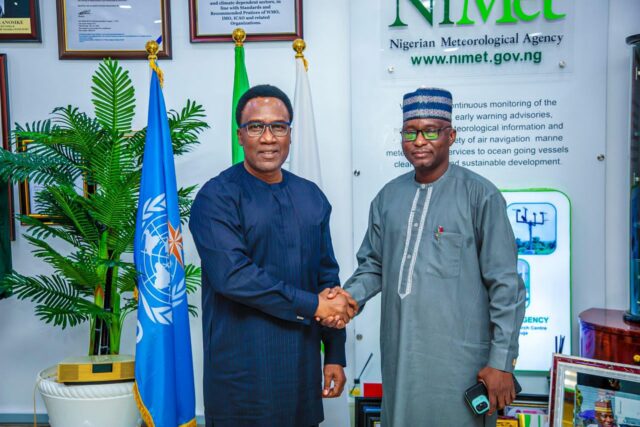The Nigerian Meteorological Agency (NiMet) is moving to strengthen its ties with Adamawa State University (ADSU), Mubi, through a formal collaboration aimed at improving climate data collection and early warning systems.
This development follows a high-level meeting between Director-General and Chief Executive Officer of NiMet, Professor Charles Anosike, and Vice-Chancellor of Adamawa State University, Professor Augustine Clement, on Tuesday, July 29, 2025, at NiMet headquarters in Abuja.
Professor Anosike highlighted the climate data collaboration potential between the two institutions, anchored by the university’s unique geographical positioning.
He stated, “The geographical positioning of Adamawa State University—within an agrarian corridor and in close proximity to critical hydrological infrastructure—presents a strategic opportunity for collaboration in meteorological observation, climate research, downscaling of seasonal climate prediction and capacity-building initiatives.”
He noted that Mubi’s proximity to major hydrological infrastructure, including the Kiri Dam, increases the relevance of localized data for disaster risk reduction.
According to him, this partnership will help extend NiMet’s services to underserved areas, enabling faster and more tailored early warning information for farmers and residents at risk.
Professor Anosike added that NiMet plans to support the university with technical resources to establish a weather monitoring station. This facility will serve both academic research and community-based forecast dissemination.
“We will formalize this collaboration through a Memorandum of Understanding. It will define clear roles in station maintenance, data generation, and transmission,” he said.
He also urged the university to actively engage with surrounding communities. Doing so, he said, would ensure the benefits of the collaboration reach those most affected by climate-related hazards.
In his remarks, Professor Augustine Clement described the partnership as timely and necessary. He commended NiMet’s continued investment in meteorological services that directly support Nigeria’s agricultural economy.
He assured that ADSU would provide the needed institutional support to sustain the partnership. He further reaffirmed the university’s readiness to collaborate in environmental monitoring and flood forecasting.
“Adamawa is prone to seasonal flooding and other climate-related issues,” Professor Clement said. “Working with NiMet will boost our state’s preparedness and response capacity.”
He said the university looks forward to contributing to climate resilience strategies, particularly through research, training, and active community engagement.
This climate data collaboration potential aligns with the National Framework for the Application of Climate Services (NFACS), which promotes partnerships between institutions to enhance climate-smart solutions across sectors.
In particular, Adamawa’s agricultural communities stand to benefit from reliable, localized forecasts that help guide planting decisions and prevent weather-related losses.
As Nigeria continues to experience increasing weather extremes, NiMet’s partnerships with academic institutions are expected to play a key role in climate adaptation efforts.






















